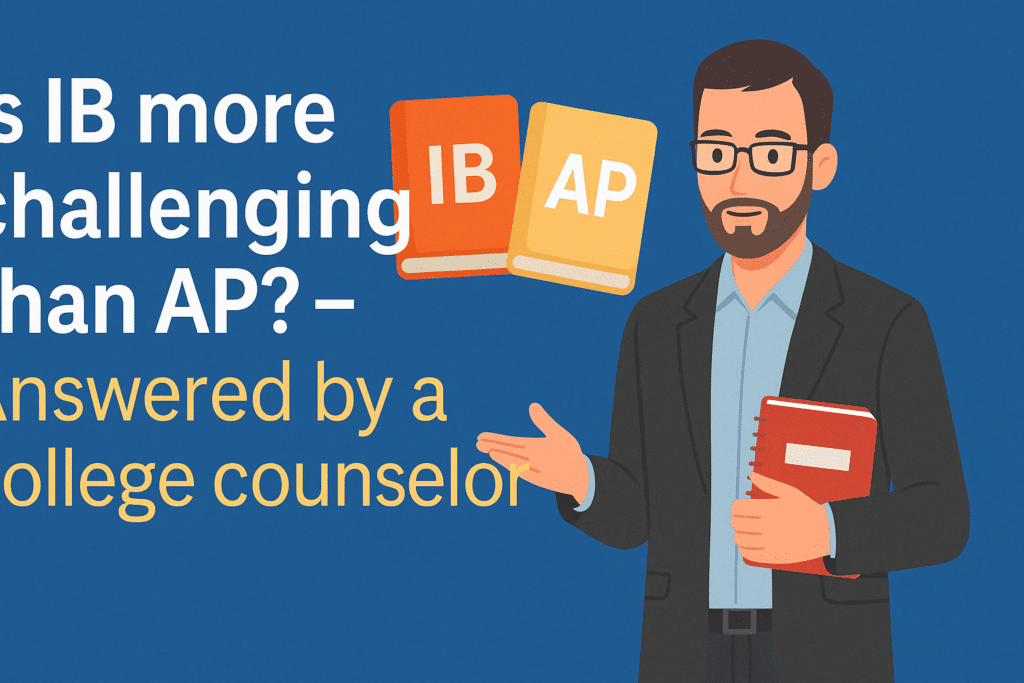Is IB More Challenging Than AP? – Answered by a College Counselor
“The better question might be: which program challenges you the right way?” – College Admissions Counselor, UK
🎯 Introduction: A Global Dilemma for College-Bound Students
You’re sitting at the kitchen table, pamphlets scattered everywhere. On one hand, your school offers the International Baccalaureate (IB) – rigorous, holistic, and globally respected. On the other hand, there’s the Advanced Placement (AP) program – flexible, specialized, and deeply rooted in the U.S. system.
And the question looms large: Is IB more challenging than AP?
As a college counselor with over a decade of experience advising families across the US, UK, UAE, and EU, I can confidently say — it depends. On your goals. Your learning style. And yes, your stamina.
Let’s break it all down — beyond the myths, beyond the rankings — into what really matters for students, parents, and educators.
🧠 IB vs AP: Quick Curriculum Breakdown
What is the IB Program?
Origin: Developed in Geneva, Switzerland
Core Components:
6 subject groups (Sciences, Math, Humanities, Languages…)
Theory of Knowledge (TOK)
Extended Essay (EE)
CAS (Creativity, Activity, Service)
Scoring: Out of 45 (6 subjects x 7 points + 3 bonus)
What is the AP Program?
Origin: Created by College Board in the U.S.
Structure:
Students take individual AP courses (can take 1 or up to 10+)
Each course culminates in a standardized exam scored out of 5
No central diploma requirement
✅ TL;DR: IB is all-in. AP is build-your-own-adventure.
💥 Which Is Harder – From a College Counselor’s Perspective
Let’s Talk About Challenge
“Harder isn’t always better. What matters is alignment with the student’s strengths.”
IB Might Be More Challenging If:
You’re not great at managing multiple long-term projects
Writing-heavy formats stress you out
You prefer flexible subject selection (IB is rigid)
You’re aiming for U.S. universities that accept AP credits for first-year exemptions
AP Might Be Easier Academically, But…
You’ll need to self-manage your depth of knowledge
No internal assessments mean high-stakes testing is everything
It’s possible to overload on APs and burn out without IB’s built-in pacing
✅ The truth? IB demands more over time. AP demands more in the moment.
📈 College Admissions: What Do Top Schools Prefer?
“Colleges don’t care which program. They care what you did with it.”
U.S. Colleges
View both IB and AP as rigorous
IB may slightly edge out in holistic strength
AP can offer college credit — cost saver!
UK, Canada, EU, and UAE Admissions
UK: IB is well known and aligns with A-Level expectations
UAE/EU: Both accepted, IB sometimes viewed as more international
Canada: IB grads often get direct entry into second year
🔍 Both programs open doors. What matters is your performance and fit.*
🧩 Real Student Voices: What They Say
Leena (Dubai – IB 44 scorer, now at LSE):
“IB was brutal, no lie. But I learned how to manage my time, write well, and connect the dots across disciplines. I felt college-ready.”
Josh (New York – AP Scholar with 9 APs, now at UCLA):
“I loved AP because I could double down on my interests. Took AP Physics and skipped the intro course in college. Worth it.”
✍️ Internal Assessments vs Exams: A Battle of Brains
| Component | IB | AP |
|---|---|---|
| Internal Assessments | Yes – 20–30% of final grade | No – 100% final exam |
| Final Exams | Yes (but balanced with IAs & coursework) | Yes (one-shot, high pressure) |
| Extended Projects | EE + TOK + CAS | Optional (no central project) |
🎯 IB rewards consistency. AP rewards peak performance.
📚 Which Is Better for Which Type of Student?
Choose IB If…
You love discussions, connections, and writing
You want global university options
You thrive on deadlines, structure, and long-term planning
Choose AP If…
You want subject flexibility
You prefer exam-based assessments
You’re targeting U.S. schools and scholarships
💡 My Advice as a College Counselor
I always ask students and families 3 core questions:
What kind of learner are you? Visual? Analytical? Reflective?
Where do you want to go? U.S., UK, EU, local universities?
What’s your current support system? Teachers, peers, time management?
Because here’s the thing:
The best curriculum is the one that makes you feel alive while learning, not burned out by it.
🏁 Final Thoughts: The Verdict?
Is IB more challenging than AP?
Yes — if we’re talking about breadth, depth, and time investment.
But AP is no joke either. Especially when taken in large volumes without context or guidance.
👉 What matters more is not the difficulty. It’s the fit.
Talk to your counselors. Think about your goals. And remember — success isn’t about the letters on your transcript. It’s about who you become through the journey.
❓ People Also Ask (FAQs):
Q1. Is IB harder than AP?
A: IB is often considered more demanding due to its holistic structure, internal assessments, and extended essays, but AP can be equally rigorous depending on course load.
Q2. Which program is better for Ivy League admissions?
A: Both are accepted and respected. What matters more is how well you perform and the rigor of your overall course selection.
Q3. Can you do both IB and AP?
A: In rare cases, yes. Some schools allow students to mix IB courses with AP exams. But it’s extremely demanding and not typically recommended.
Q4. Do colleges give credit for IB or AP?
A: Most U.S. colleges grant credit for high AP scores. Some also recognize high IB scores, especially with a full diploma.
Still not sure which path is for you? Explore more guides on HeLovesMath.com and talk to your school counselor. This journey is yours. Own it. 💬


